We are big movie fans here at the Silver Century Foundation, but the silver screen hasn’t been overly kind to older characters. Hollywood’s ageist bent is easily exposed when older adults are depicted as comic sidekicks or stereotyped grandparents—when there is no role for them at all. Happily, more and more filmmakers around the world are tackling the subject of growing older with honesty, insight and beauty. Pete Croatto takes a look at films that were selected by SCF because they examine age and aging in ways that challenge us to think about our own views of growing older.
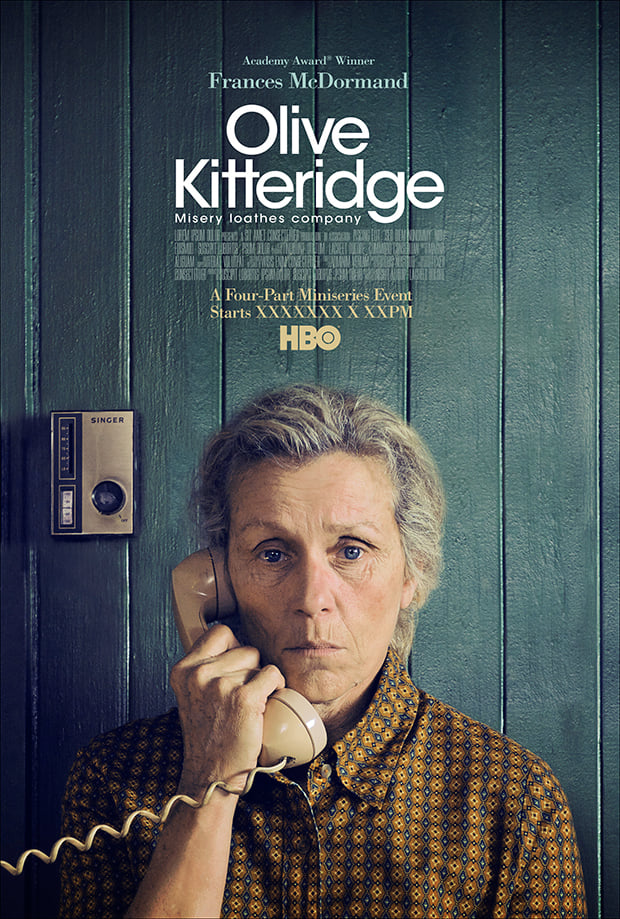 Olive Kitteridge Posted in: Cinema, Families
Olive Kitteridge Posted in: Cinema, Families2014, USA, 240 min. (four hour-long episodes)
Prickly and curt, lifelong Mainer Olive Kitteridge (Frances McDormand) revels in control. She maintains the upper hand in her marriage to kindly Henry (Richard Jenkins), the beloved town pharmacist, and their sensitive son, Christopher (John Gallagher Jr.). Olive exists in a disgruntled, self-satisfied equilibrium, but over 25 years, crises force emotions to surface. Henry’s endless patience and health wobble; Christopher grows up and cannot comprehend his mother’s indifference toward his churning turmoil. The world Olive spent her life cultivating is eroding. Can she regain her footing? Working from Elizabeth Strout’s Pulitzer Prize-winning 2008 novel, director Lisa Cholodenko has crafted a gut-punch to our souls. One woman’s inability to compromise forces everyone in her orbit to recalibrate their lives. Olive Kitteridge feels both grand and intimate, painful and joyous, because we can all relate to what unfolds.
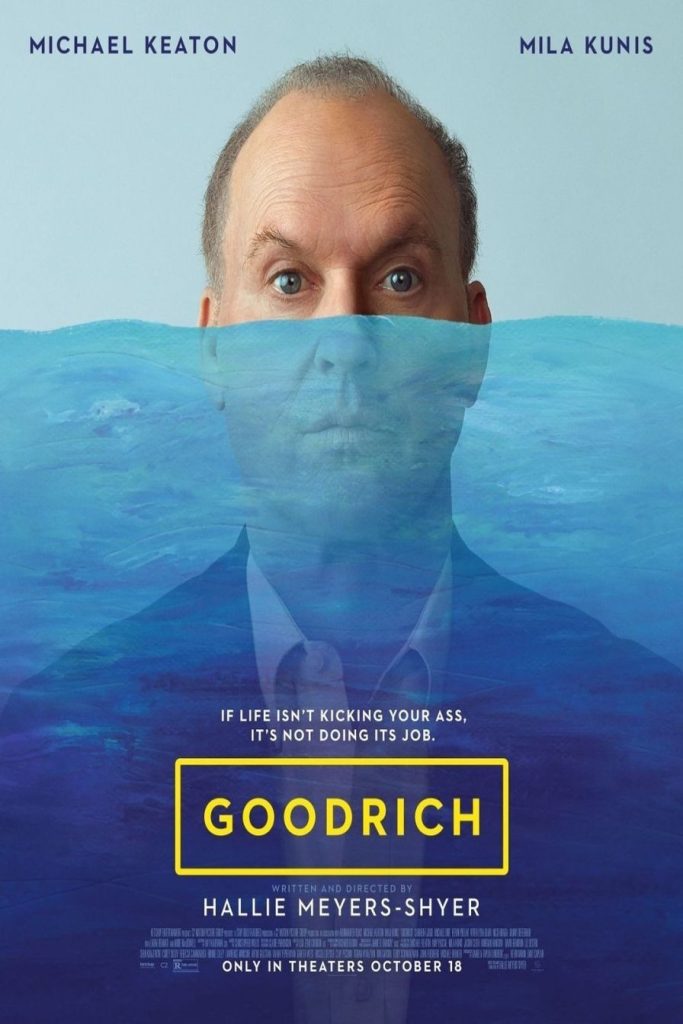 Goodrich Posted in: Arts, Cinema, Families
Goodrich Posted in: Arts, Cinema, Families2024, USA, 110 min.
Work is king for Andy Goodrich (Michael Keaton), more so since his boutique LA art gallery inches toward bankruptcy. Now, the rigors of family life that he has conveniently neglected have stormed the gates. His neglected second wife (Laura Benanti) suddenly enters rehab for a 90-day stint, leaving Goodrich in charge of their 9-year-old twins. Overwhelmed, he leans on his adult daughter, Grace (Mila Kunis), an arrangement that benefits Andy but wounds Grace, who is pregnant with her first child. Andy as a reliable, present dad is something she never had. The comedy-drama comes alive whenever Kunis and Keaton are together. Their characters navigate a relationship whose growth is hindered by a lifetime of resentment and Andy’s perpetual unreliability. Goodrich poignantly portrays how a second chance can’t come at the expense of loved ones from our first go-around.
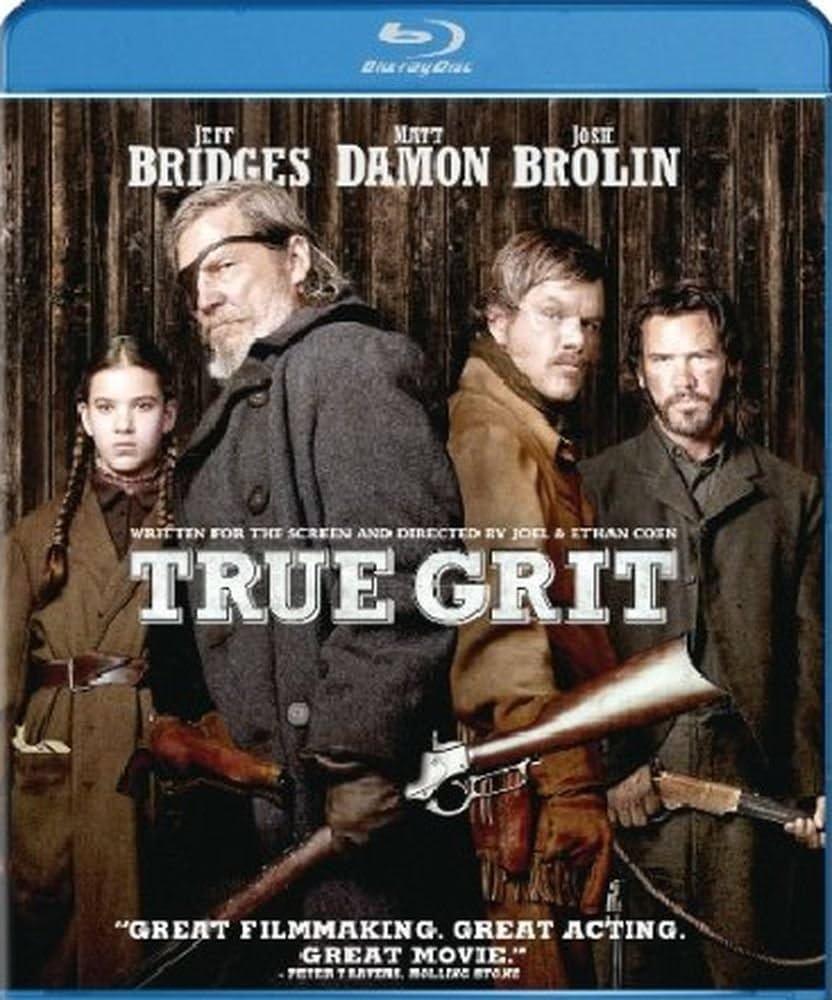 True Grit (2010) Posted in: Arts, Cinema, Later Life Quests, Mortality
True Grit (2010) Posted in: Arts, Cinema, Later Life Quests, Mortality2010, USA, 110 min.
The Coen Brothers’ remake of the surprisingly sunny, straight-ahead, 1969 western classic is a sparse, tight noir that ranks alongside unsentimental masterpieces such as The Wild Bunch and Unforgiven. Ornery, unkempt and borderline indecipherable, aging tracker Rooster Cogburn (Jeff Bridges) takes on a no-nonsense client (Hailee Steinfeld), a 14-year-old girl of brusque and eloquent efficiency determined to find her father’s killer (Josh Brolin). The pair head deep into Indian Territory, with help from a fancy-pants Texas Ranger (Matt Damon), and fall deeper into a metaphor: vengeance exacts a heavy toll on young and old alike. Nobody walks away cleansed by vindication. Thanks to Roger Deakins’ haunting cinematography and a bevy of outstanding performances (Steinfeld matches Bridges, scene for scene), a tale of flawed, stoic heroism becomes cliché-free cinematic poetry.
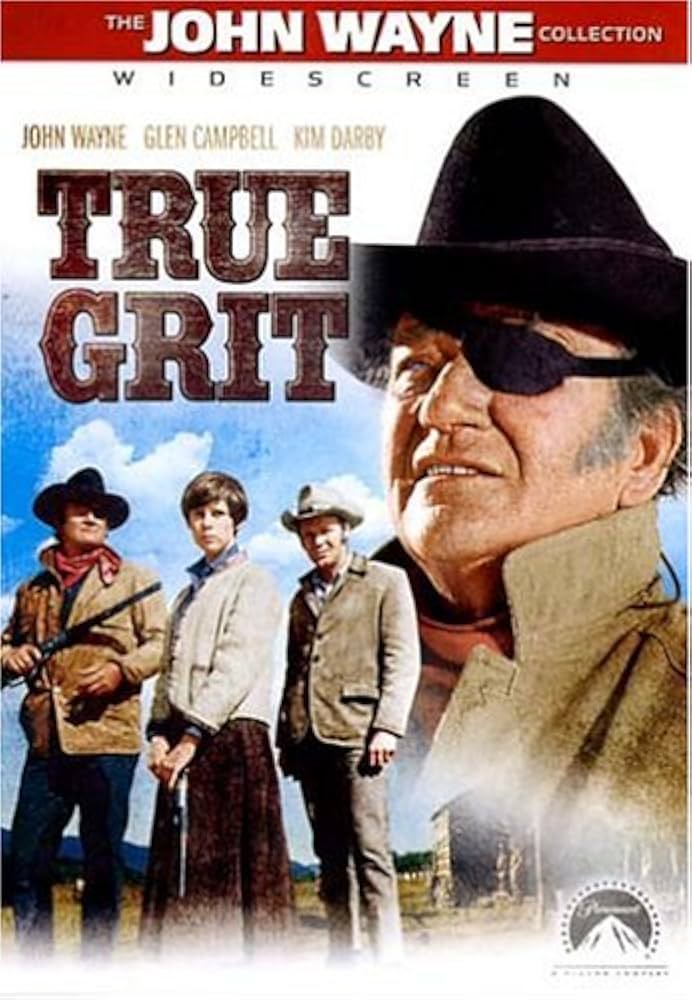 True Grit (1969) Posted in: Arts, Cinema, Friendships, Later Life Quests, Mortality
True Grit (1969) Posted in: Arts, Cinema, Friendships, Later Life Quests, Mortality1969, USA, 128 min.
Far sunnier than the bluntly poignant 2010 remake, this is still eminently watchable. John Wayne plays an alcoholic, one-eyed, US marshal hired by a precocious teen (Kim Darby) to find her father’s killer in the vast Indian Territory. Released the same year as The Wild Bunch and a few years after Sergio Leone’s spaghetti westerns, the film was already an anachronism. Though it is perhaps the last of the traditional, straight-ahead westerns (many of which starred Wayne), it’s a rousing reminder of classic Hollywood swagger—and that integrity and courage don’t dim with age. Wayne, that embodiment of rigid, matinee-idol machismo even in his 60s, is perfect in his only Oscar-winning role, which might be his most vulnerable performance. Dying is easy; aging is hard—especially if you’re a survivor in a lawless occupation.
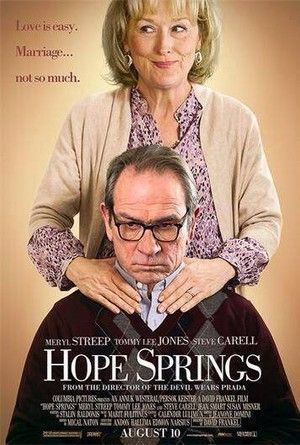 Hope Springs Posted in: Cinema, Long-Lasting Marriages, Midlife
Hope Springs Posted in: Cinema, Long-Lasting Marriages, Midlife2012, USA/Canada, 100 min.
After 31 years of marriage and two kids, Kay (Meryl Streep) and Arnold (Tommy Lee Jones) have their life in order. Arnold is satisfied; Kay, on the other hand, has been driven to quiet misery. Forget about sex—any sign of intimacy has eroded. They’re alone together. “Is it too warm in your room?” Arnold asks when she pays a hopeful visit to his bedroom, only to leave in quiet embarrassment. Desperate for change, Kay drags Arnold 1,500 miles to a famed marriage therapist (Steve Carell) for a week of counseling sessions. Jones and Streep play off each other expertly, and director David Frankel does not approach the material as a sex farce or he-said, she-said carping. The couple learns in real time through honest conversations and not-always-successful “sexercises” how to write their final chapters. Alternately touching and insightful, Hope Springs is that rare treat: a sweet, tender movie about people we know.
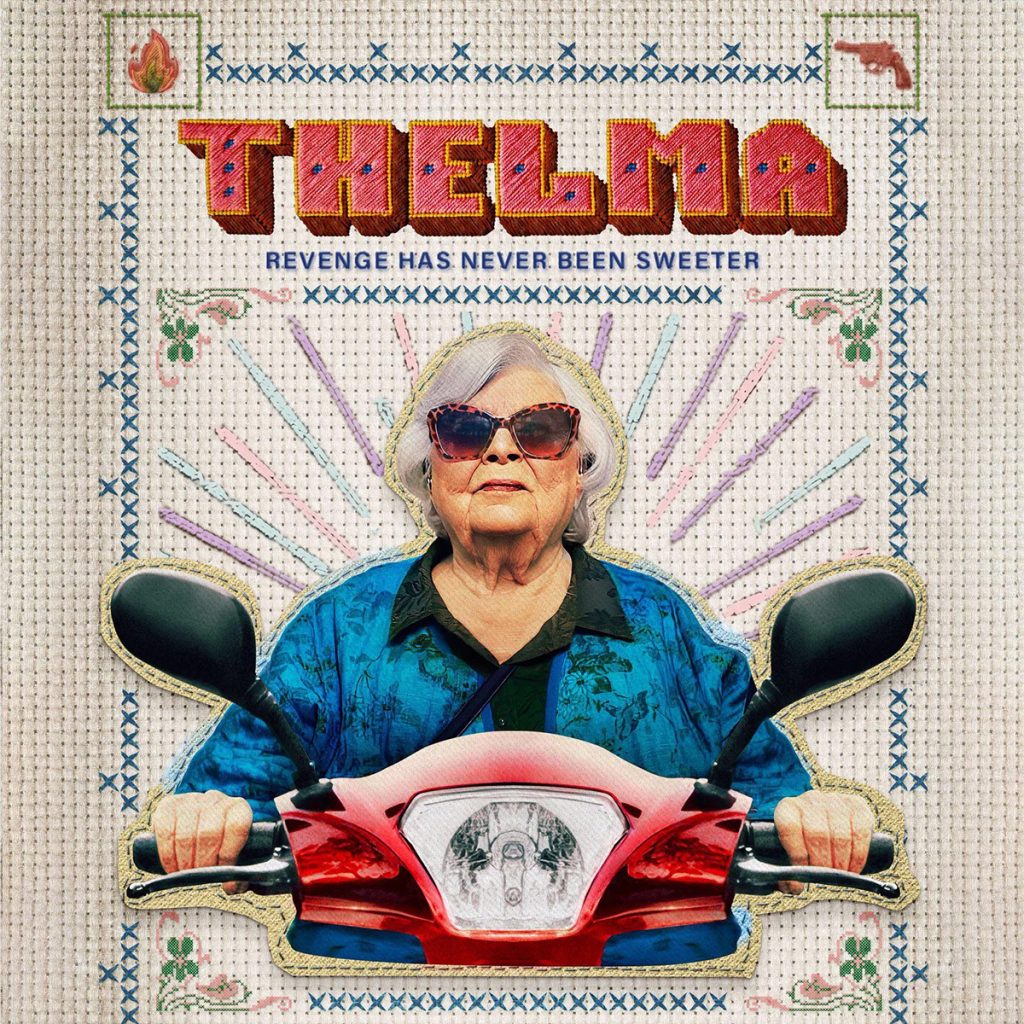 Thelma Posted in: Arts, Cinema, Comedy Drama, Families
Thelma Posted in: Arts, Cinema, Comedy Drama, Families2024, USA/Switzerland, 98 min.
Thelma Post (June Squibb) is 93 and thriving on her own. But Thelma’s independent lifestyle becomes threatened after she loses $10,000 in a phone scam, prompting concerns from her overprotective, loving family. Thelma decides to get the money back, enlisting a longtime friend (Richard Roundtree) and his scooter for a trip over Los Angeles’s sidewalks. The plot sounds as if it’s designed to insult older adults for easy laughs, but that’s a subterfuge. Thelma’s growth as a person is the hook, not her quest for vengeance. Writer-director Josh Margolin’s ebullient, thoughtful comedy-drama is a tender, authentic look at aging, specifically the battle between asking for help and maintaining independence. And it moves at the pace of a top-notch detective story. Squibb is excellent, but Roundtree (in his final role) is exceptional as her partner and philosophical opposite.
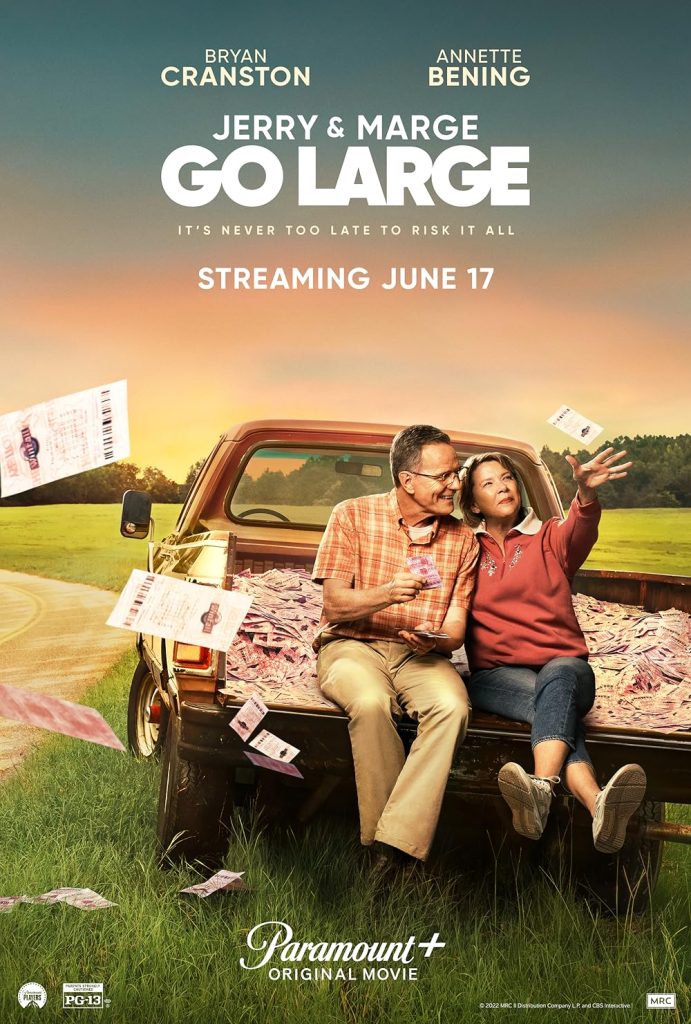 Jerry and Marge Go Large Posted in: Arts, Based on True Stories, Cinema, Long-Lasting Marriages
Jerry and Marge Go Large Posted in: Arts, Based on True Stories, Cinema, Long-Lasting Marriages2022, USA, 96 min.
Since retiring, Jerry (Bryan Cranston) faces a string of endless days in his small Michigan town. During one, he reads the tiny print of a lottery game. Jerry, a math whiz, is stunned by his calculations. If he buys a certain number of tickets, he’s guaranteed to win and the more he spends, the more he gets. When his wife, Marge (Annette Bening), learns Jerry has been (successfully) testing his theory, she’s all in. “Let’s be stupid,” she says. “We need something for us.” The pair make regular road trips to buy tickets in Massachusetts, first for themselves, and then for seemingly the entire town in what becomes a lucrative investment strategy. But will the success last? What elevates Jerry and Marge Go Large beyond its “did-this-really-happen?” story line are Cranston and Bening’s winning performances as the long-married couple that find their second wind by throwing caution to it. Touching and authentic, the movie (based on a true story) never cheapens its characters or their journey.
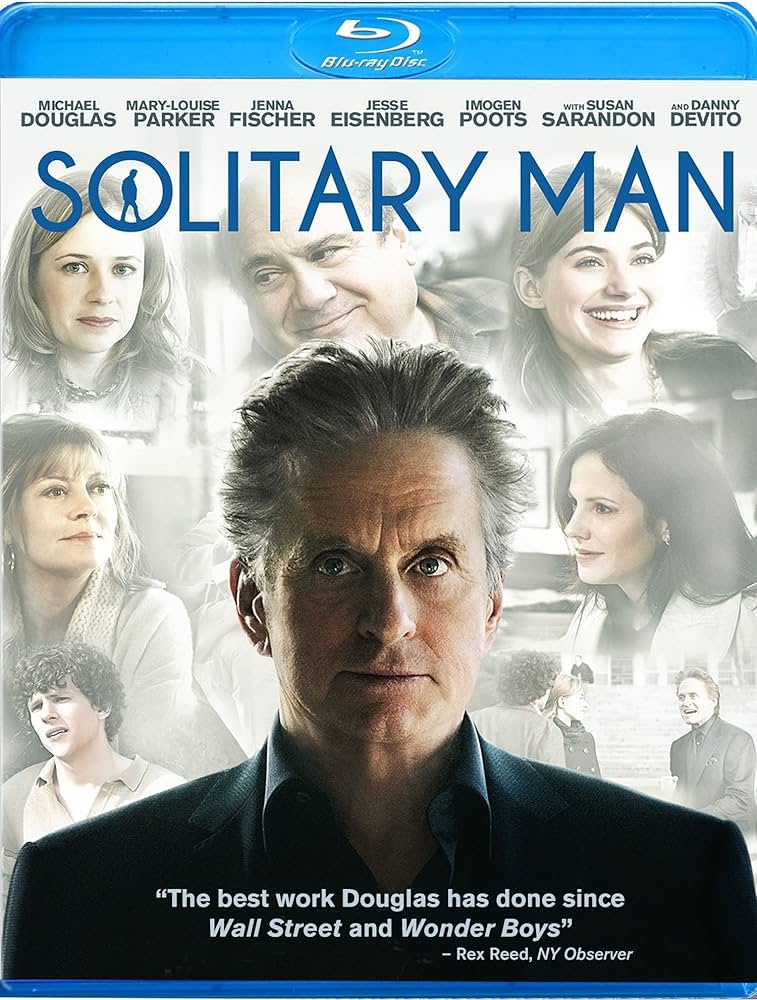 Solitary Man Posted in: Arts, Cinema, Families, Midlife
Solitary Man Posted in: Arts, Cinema, Families, Midlife2009, USA, 90 min.
Nearly seven years ago, NYC car salesman extraordinaire Ben Kalmen (Michael Douglas) had everything. Then it all crumbled. A health scare initiated a late-life crisis fueled by a self-destructive obsession with younger women. Pushing 60, Ben—who refuses to change his impetuous ways—is poised to re-enter the business world. But his misguided life philosophy continues to wreak havoc on himself and the people in his life who still love him, including his adult daughter (Jenna Fischer) and ex-wife (Susan Sarandon). Brian Koppelman and David Levien’s smart, tart parable about how chasing youth and vitality spoils what we already have succeeds because of Douglas, who plays Casanova and lost soul with equal aplomb. The supporting cast is terrific, especially Danny DeVito as Ben’s college friend, who offers common sense and salvation.
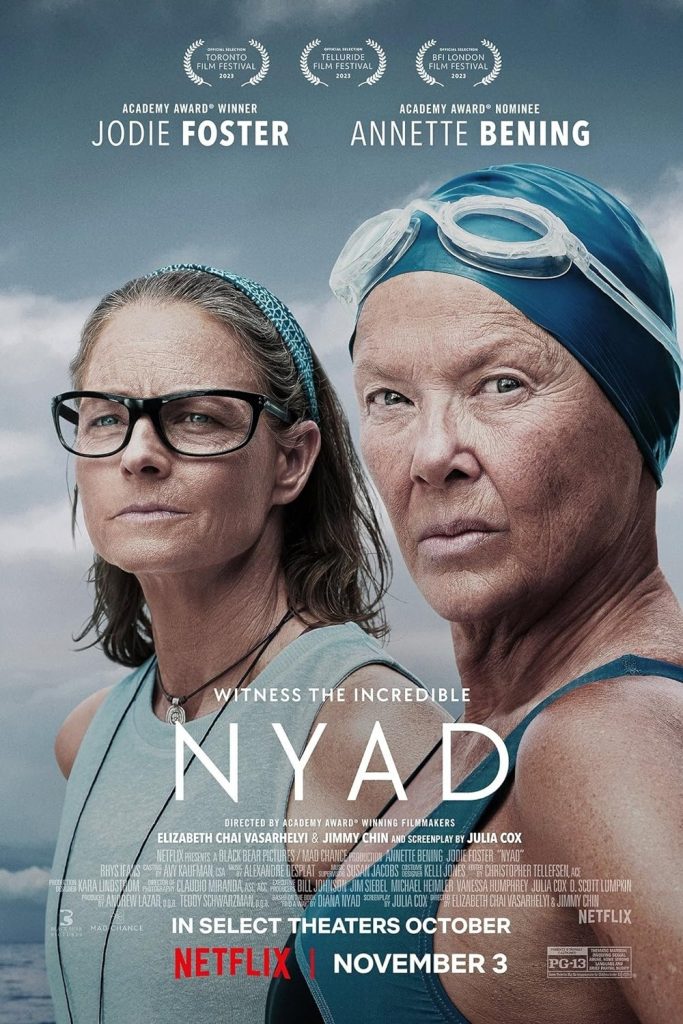 Nyad Posted in: Arts, Cinema, Friendships, Later Life Quests
Nyad Posted in: Arts, Cinema, Friendships, Later Life Quests2023, USA, 121 min.
In 1978, Diana Nyad fails to swim from Cuba to Florida, a 110-mile ordeal in shark-infested waters. Years pass. Celebrity has dimmed. The former long-distance swimmer finds herself lost. “You turn 60 and the world treats you like a bag of bones,” Nyad (Annette Bening) tells her best friend Bonnie (Jodie Foster). So Nyad heads to the pool after a 30-year break. Soon, she is convinced she can swim to Cuba. As she spends years battling nature’s viciousness and pushing her threshold for pain, we learn that this is not an ego trip. It’s about resolving a painful past and living life on her terms. Bening’s spirited, vulnerable portrayal makes this story relatable. Foster is exceptional as the friend-turned-coach, who alternately inspires and admonishes the swimmer. Nyad is a stirring reminder that there’s no age limit to pushing past your boundaries—especially if you lean on your allies.
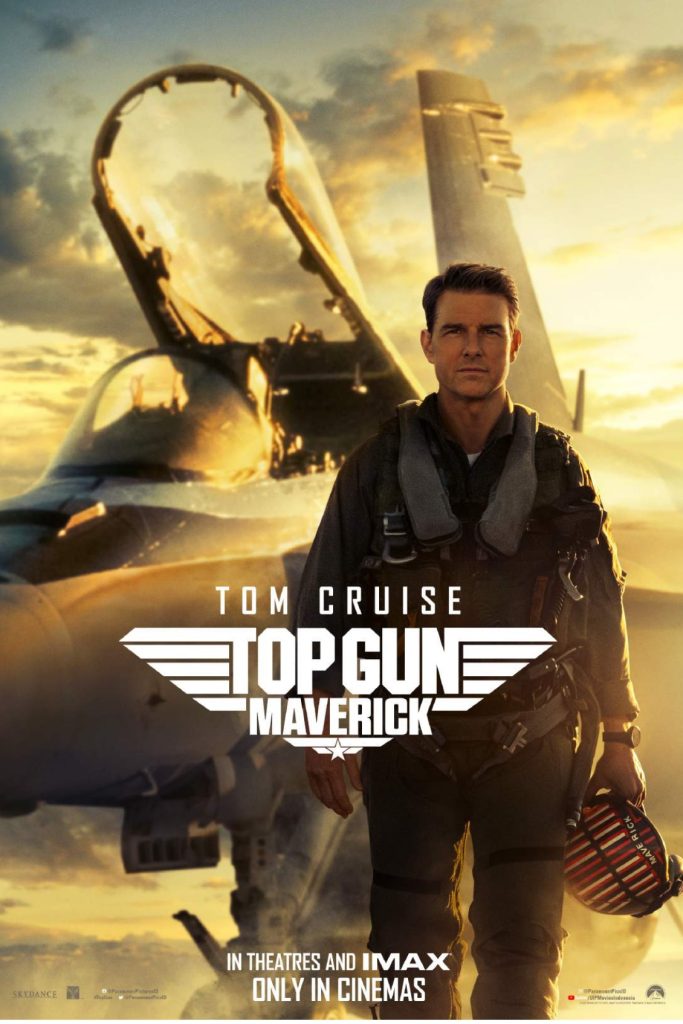 Top Gun: Maverick Posted in: Arts, Cinema, Midlife, Mortality
Top Gun: Maverick Posted in: Arts, Cinema, Midlife, Mortality2022, USA, 130 min.
Nearly 40 years after his aerial heroics in Top Gun (1986), Captain Pete “Maverick” Mitchell (Tom Cruise) faces irrelevance as he rounds past middle age. His risky approach to flying jets is again considered reckless, but redemption awaits. Maverick is asked to prepare young fighter pilots for an upcoming attack mission, a gig that gets complicated when he discovers that one of his charges is Rooster (Miles Teller), the son of his late friend and former wingman, Goose. Maverick has to channel his rebelliousness into a final shot at building a worthwhile professional and personal legacy. By peeling back the high-flying machismo to reveal the vulnerability of a fading, adrenaline-fatigued hero, Top Gun: Maverick is the rare blockbuster that finds excitement in the twisty emotional landscape of its aging protagonist.
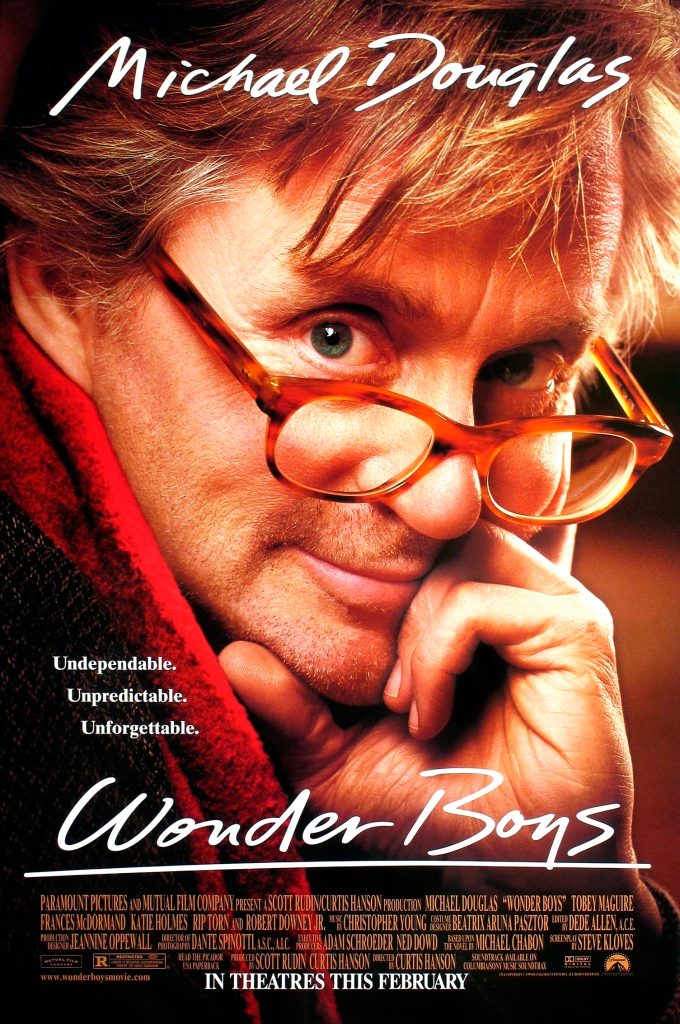 Wonder Boys Posted in: Cinema, Comedy Drama, Midlife
Wonder Boys Posted in: Cinema, Comedy Drama, Midlife2000, USA/Germany/UK/Japan, 103 min.
Through the 1980s and 1990s, Michael Douglas garnered a reputation for playing aging men whose bubbling libidos doubled as domestic cautionary tales. This resonant, honest drama, based on Michael Chabon’s novel, is about the messiness of resurrection, not the ease of destruction. Douglas plays college professor Grady Tripp, a once-hot novelist, whose life is now a mess: a failed marriage, too much pot, and an unfinished, long overdue novel that his editor desperately wants. Over the course of an unwieldy weekend, Tripp undergoes an emotional reckoning spurred in part by a troubled but brilliant writing student (Tobey Maguire) and a revelation from his mistress (Frances McDormand), who happens to be his boss. Writer Steve Kloves and director Curtis Hanson keep the action brisk and frenetic without diminishing Tripp’s gradual escape from this self-made crisis. He can no longer hide in the shadows of his shortcomings.
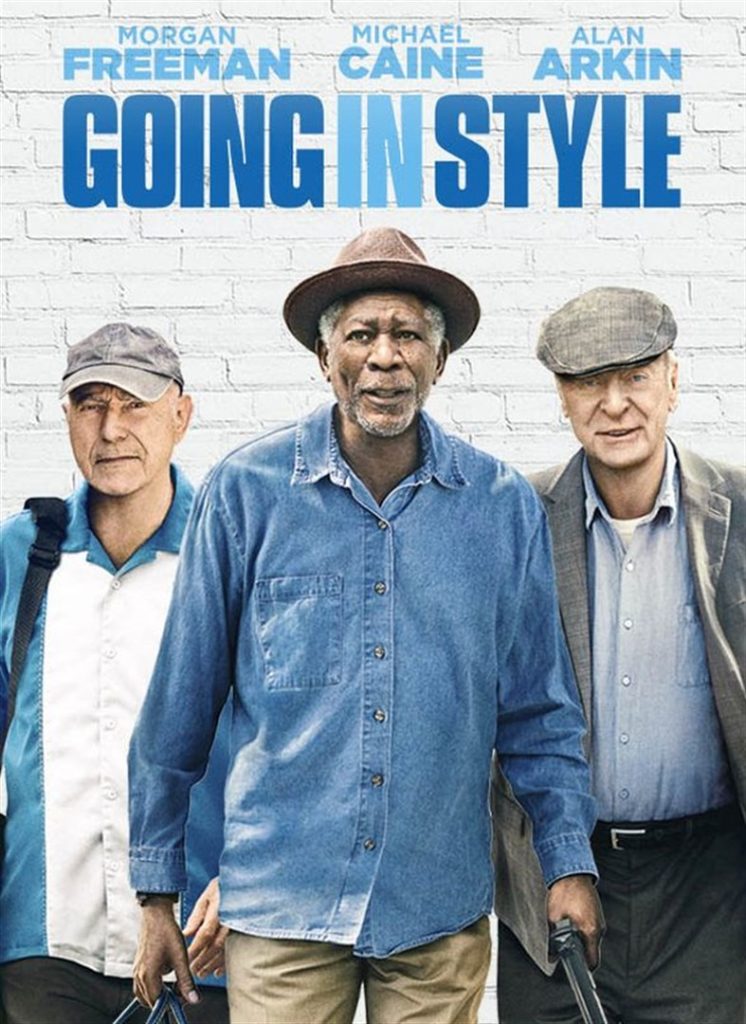 Going in Style Posted in: Arts, Cinema, Comedy Drama, Friendships, Later Life Quests, Mortality, Retirement
Going in Style Posted in: Arts, Cinema, Comedy Drama, Friendships, Later Life Quests, Mortality, Retirement2017, USA, 96 min
Director Zach Braff’s remake of the quiet, thoughtful, 1979 comedy-drama ups the cat-and-mouse maneuvers, raises the stakes and modernizes the story line. Brooklyn friends Joe (Michael Caine), Albert (Alan Arkin) and Willie (Morgan Freeman) decide to rob the mega bank that has taken their pension money, after they’ve been laid off from their longtime factory jobs. What ensues is more laugh-heavy than the original, sometimes to its disadvantage—Christopher Lloyd’s superfluous appearance as a forgetful member of the friends’ social circle is flat-out ageist, a series of worn stereotypes presented as cheap comic relief . But the main characters’ comradery and their refusal to be marginalized by society make for a pleasing, moving effort.
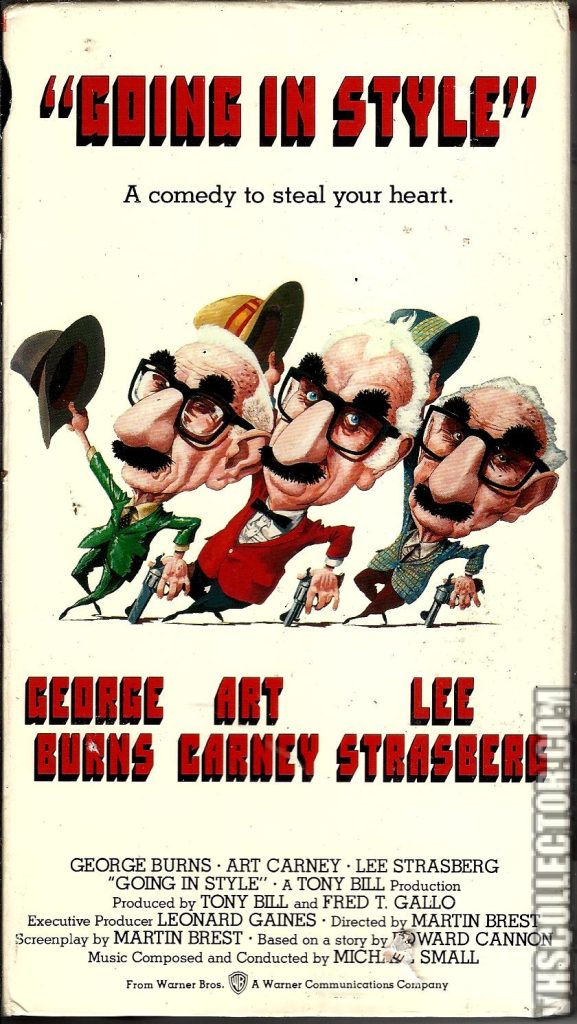 Going in Style Posted in: Arts, Cinema, Comedy Drama, Friendships, Later Life Quests, Mortality, Retirement
Going in Style Posted in: Arts, Cinema, Comedy Drama, Friendships, Later Life Quests, Mortality, Retirement1979, USA, 97 min.
New York City retirees Joe (George Burns), Al (Art Carney) and Willie (Lee Strasberg) are at the point where spare time has become a burden. Their days are spent idling in the local park or in their drab apartment; excitement is treated like a dietary restriction. So when Joe casually mentions they should rob a bank—it’ll provide a dose of adrenaline and is a shrewd fiduciary strategy!—Willie and Al agree. Then reality sets in. Director Martin Brest wisely eschews easy jokes for a meditation on mortality. The robbery and its aftermath invigorate Joe but aren’t a tonic for Al and Willie, who become overwhelmed by the audacity of their act. By rejecting easy solutions for the loss of purpose that can come with aging, Brest fashions a bittersweet gem. The entire cast is game, especially Burns, who shelves his famed mugging to deliver a terrific performance.
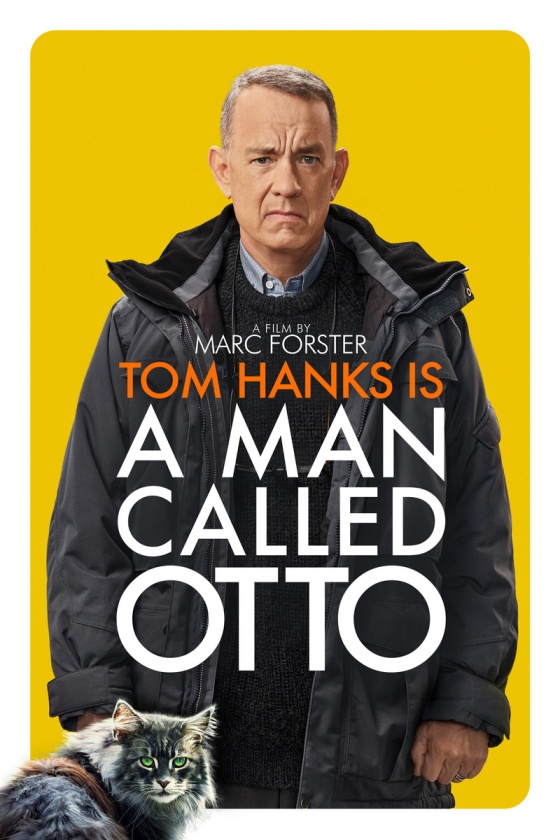 A Man Called Otto Posted in: Arts, Cinema, Families, Friendships, Single, Widowed or Divorced
A Man Called Otto Posted in: Arts, Cinema, Families, Friendships, Single, Widowed or Divorced2022, USA, 126 min.
Otto (Tom Hanks) lives in a state of constant aggravation. He treats any interruption to his orderly life as a threat. The bluster hides a deep, unspeakable pain: Otto, recently widowed and forced to retire, wants to end his life. Every time he attempts to do so, life pulls him back. Quite often, he’s interrupted by his new neighbor Marisol (Mariana Treviño), whose kindness and authentic nature replenish his soul. Otto discovers, despite his best efforts, that people need him in ways he couldn’t possibly imagine. The American version of the beloved novel A Man Called Ove runs on Hanks’ inherent, unshakeable likability, which enhances the movie’s message: we are never alone. If we open our lives (and hearts) to people, rebirth is possible at any age.
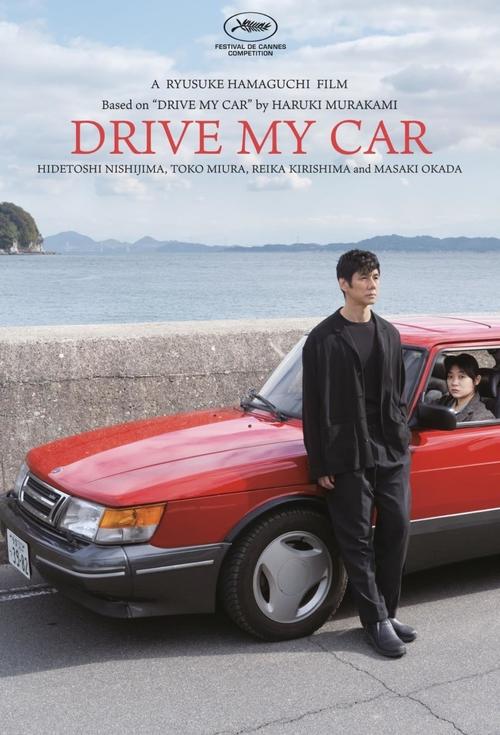 Drive My Car Posted in: Arts, Cinema, Midlife
Drive My Car Posted in: Arts, Cinema, Midlife2021, Japan, 179 min. (subtitled)
An aging, renowned Japanese stage actor (Hideyoshi Nishijima) directs a production of Uncle Vanya in faraway Hiroshima, another opportunity for him to retreat into an artistic bubble built by tragedy and 20 years of simmering grief. His stasis gets challenged when he is required by his client to use a chauffeur (Tôko Miura), a stoic young woman who carries her own emotional load. That (literal) change in perspective unlocks a slow, emotional awakening, which we see through his conversations with his lead actor (Masaki Okada) and the driver. Director and co-writer Ryûsuke Yamaguchi’s Oscar-winning drama is languidly paced, which gives the proceedings an existential wallop as the characters confront the roles fate has saddled them with. More than an exploration of art vs. life or a treatise on grief, Drive My Car is an uncompromising, beautiful film about the necessity and beauty of living an honest, open life at any age.
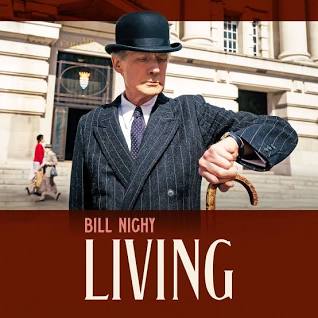 Living Posted in: Arts, Cinema, Mortality
Living Posted in: Arts, Cinema, Mortality2022, UK/Japan/Sweden, 102 min.
In early 1950s London, lifelong bureaucrat Mr. Williams (Bill Nighy), whose life is all rigid routine and almost comatose stoicism, receives a shattering diagnosis. After a couple of attempts at living life to the fullest—including a drunken, sentimental night in a seaside town—he devotes his attention to a small, crumbling, neighborhood playground. This short, bittersweet character study leans heavily on Nighy’s exquisite, Oscar-nominated performance—you can practically see the weight of buried feelings in every gesture—and the narrative shifts in Nobel Prize-winning novelist Kazuo Ishiguro’s script. But Living’s bittersweet, even rueful, message emerges. Committing the smallest act, even in the autumn of our years, can tie up many loose ends, though some matters of the heart remain heartbreakingly unresolved. Adapted from Akira Kurosawa’s Ikiru.
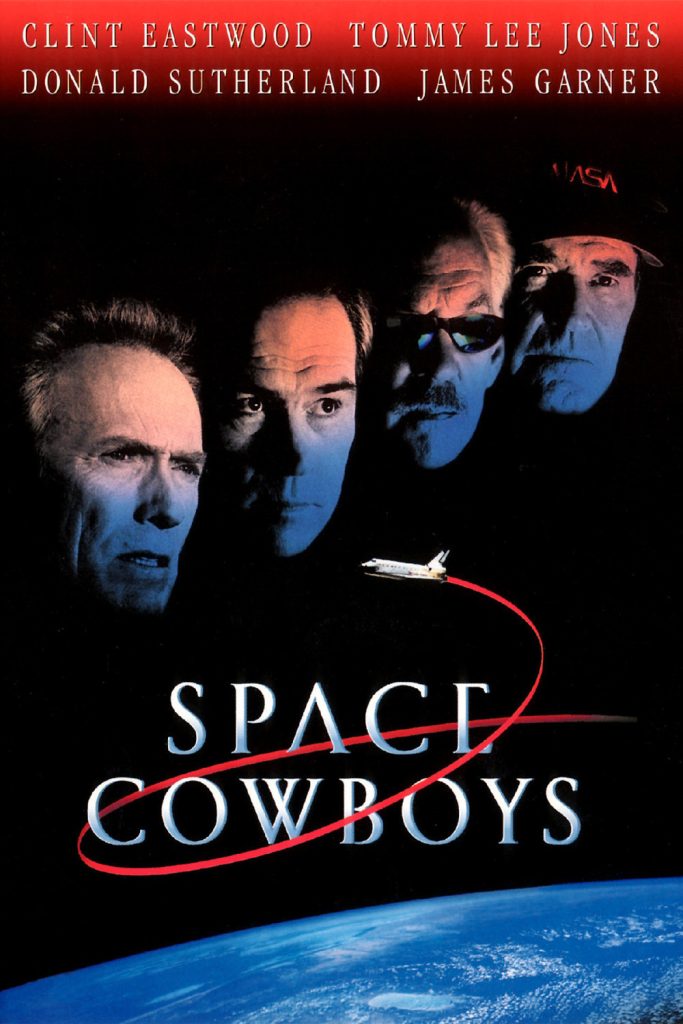 Space Cowboys Posted in: Arts, Cinema, Later Life Quests
Space Cowboys Posted in: Arts, Cinema, Later Life Quests2000, US, 130 min.
Forty years after he was exiled from a nascent program called NASA, engineer Frank Corvin (Clint Eastwood, who also directed and produced) is recruited to retrieve an out-of-orbit Russian satellite with his antiquated guidance system. He agrees on one condition: he will do the job with his long-disbanded Air Force team, who have exactly zero astronaut experience. Old tensions and new challenges emerge as Frank and his crew (Tommy Lee Jones, Donald Sutherland and James Garner) hastily train and then head into space. What elevates the film beyond the “seniors proving themselves” gimmick is its embrace of friendship and sacrifice as qualities that ripen with time. This crowd-pleaser radiates heart and warmth, thanks to the first-rate cast, led by Jones as an irascible daredevil forced to confront his mortality.
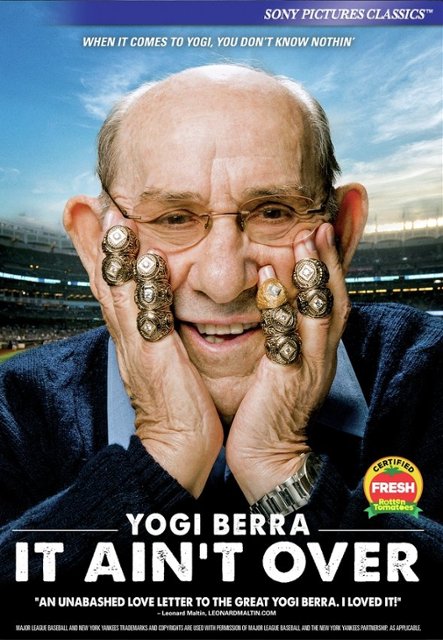 It Ain’t Over Posted in: Arts, Based on True Stories, Cinema, Documentaries
It Ain’t Over Posted in: Arts, Based on True Stories, Cinema, Documentaries2023, USA, 99 min.
To many younger Americans, Yogi Berra (1925-2015) wasn’t a Hall of Fame baseball player and a cog in the New York Yankees’ endless dynasty, but a lovable old font of folksy wisdom (“When you get to a fork in the road—take it!”) with a funny name and a teddy-bear physique. In this heartwarming documentary, director Sean Mullin—relying on interviews with the baseball legend’s friends, teammates and family members—examines Berra’s accomplishments as a baseball player and explores his personal life. Berra was a devoted family man who stormed Normandy in World War II. He happily bonded with younger ballplayers in his later years, instead of living in the curdled past. This is the rare sports documentary that hits a personal note, reminding us that a life lies behind every older person we dismiss or thoughtlessly categorize. Berra becomes a proxy for the older relative and neighbor we choose to know in a limited way.
 Juniper Posted in: Arts, Cinema, Comedy Drama, Families
Juniper Posted in: Arts, Cinema, Comedy Drama, Families2021, New Zealand, 94 min.
Injured and out of options, retired war photojournalist Ruth (Charlotte Rampling) recovers at her estranged son’s house in rural New Zealand. With her son away on business, her teenage grandson, Sam (George Ferrier), becomes a reluctant caretaker, even as he grieves for his recently deceased mother. Ruth is not a model patient. She’s belligerent, condescending and frequently drunk. The two start as distrustful strangers, but their pain draws them closer. He is sensitive and obstinate, tough emotions to balance at any age, but the perfect tonic for Ruth’s stubbornness. She provides the attention and blunt guidance Sam has undoubtedly lacked since his mother’s death. As Ruth’s stay grows longer, she learns the value of letting people in and letting go. Matthew J. Saville’s touching comedy-drama about the necessity of vulnerability is fueled by Rampling’s lively, vulnerable performance.
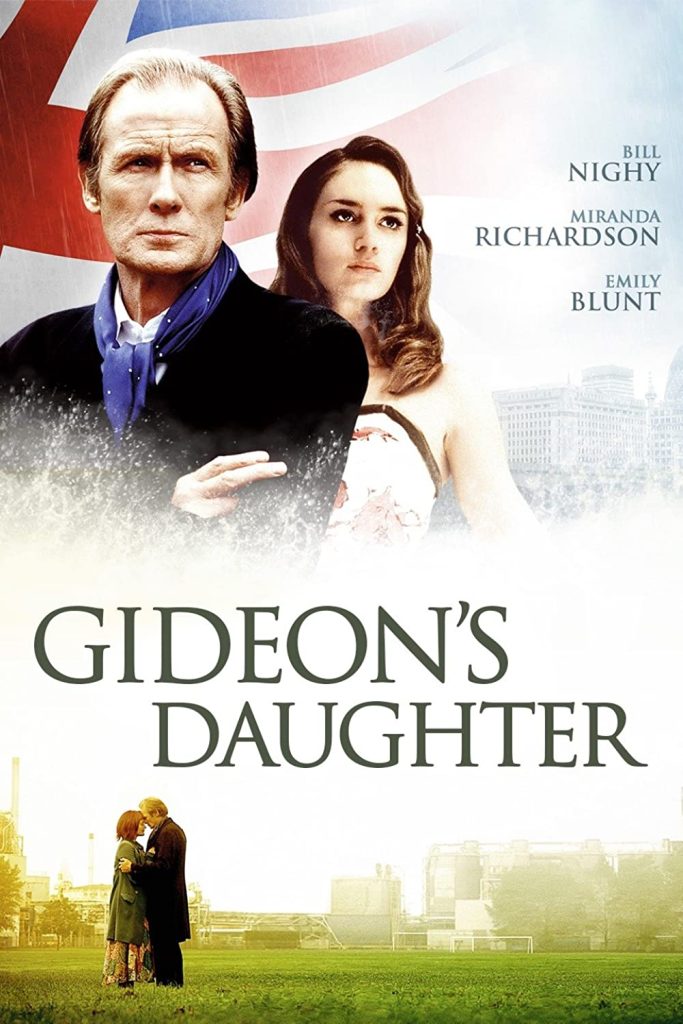 Gideon’s Daughter Posted in: Arts, Cinema, Midlife
Gideon’s Daughter Posted in: Arts, Cinema, Midlife2005, UK, 105 min.
Veteran London public relations maven Gideon (Bill Nighy) has the biggest names in entertainment and politics eager for his counsel. But does it matter? His teenage daughter (Emily Blunt) is set to graduate high school, pushing him toward irrelevance in her life. Around this time, Gideon develops a relationship with an offbeat divorcée and grieving mother (Miranda Richardson), whose directness and working class values contrast with Gideon’s life of affluent influence. Stuck between the gravitational pull of these two women, Gideon reevaluates what matters in his life after years of striving for material success. Writer-director Steven Poilakoff has crafted a simple, touching story about people connecting with each other as they rediscover themselves, one that is enhanced thanks to Nighy’s and Richardson’s outstanding performances.


